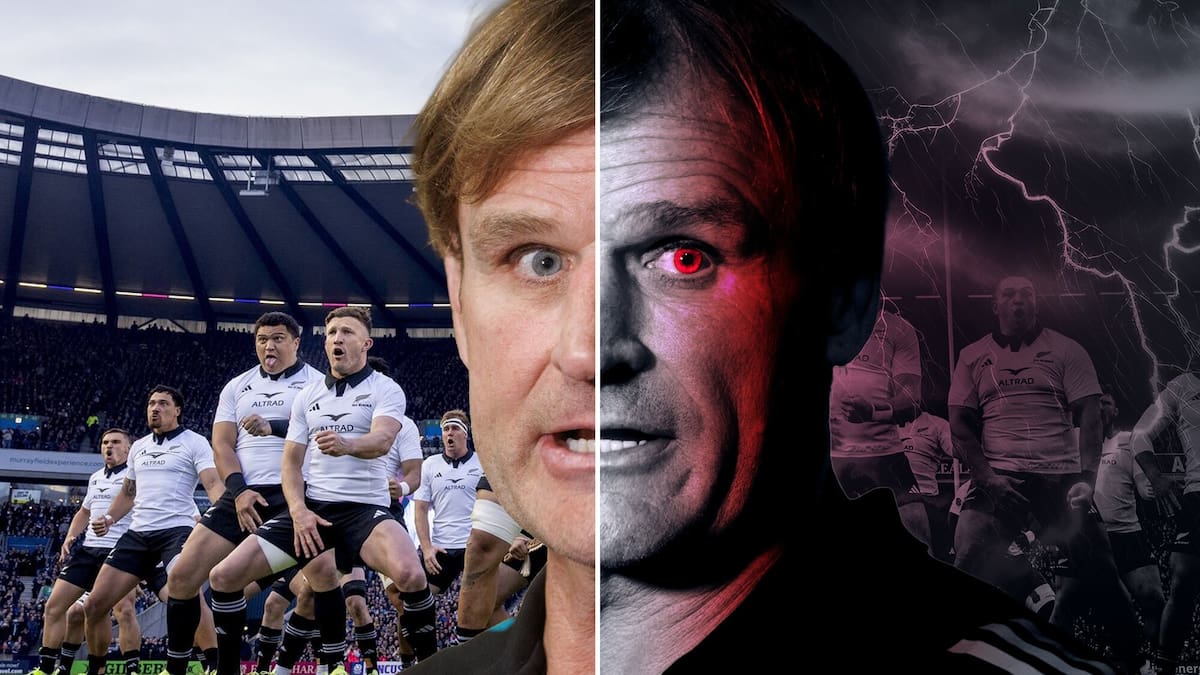Their Jekyll-and-Hyde nature makes them impossible to truly gauge, and halfway through their quest to securing a Grand Slam it’s not clear if this All Blacks team is finding their resolve and building the resilience required to consistently win in the golden age of test rugby – or simply riding their luck.
If the win against Ireland in Chicago felt a little wobbly, the victory in Edinburgh was on another seismic scale entirely, with the All Blacks shaken to their core by a Scotland team that was both able and enabled to build what felt like irresistible momentum in the 25 minutes after halftime.
It was a period in which New Zealand were like the punch-drunk boxer, swaying around on the ropes, their legs almost gone, but with enough wherewithal and energy to somehow stay in the fight and keep dodging the knockout blow.
Their scramble defence was impressive, almost miraculous at times, but Murrayfield was in no doubt that it was witnessing the unprecedented sight of an All Blacks team under such mental duress as to have no other plan but to hack the ball into touch and enjoy the 20 seconds or so of blessed relief that would bring.
Scott Robertson’s men were run close by Scotland, in Edinburgh. Photo / Photosport
It was a period in which it felt like there were 15 New Zealanders battling against five million Scots and the sheer desire within the All Blacks to not succumb was impressive.
But the inconvenient truth is that Scotland felt the weight of history bearing down upon them and were crushed by it.
The victory was not built on New Zealand’s bravery, but Scotland’s trepidation and bout of stage fright. It’s unlikely that even Damian McKenzie would have been able to save the All Blacks had Pierre Schoeman not dropped the ball a metre from the tryline, or if the diminutive Darcy Graham had slightly larger hands to grip the ball as he dived for the corner.
If Scotland had converted either of those two gilt-edged chances they would have gone ahead and most probably it would have been their day as the All Blacks were so ragged and panicky at that stage, that a 21-17 lead would have felt insurmountable.
There is one school of thought that says the All Blacks did brilliantly to contain and survive Scotland’s momentous surge, and then conjure a killer blow of their own, and another that questions how they built a commanding 17-0 halftime lead and then found themselves hanging on against the world’s eighth-best team.
What supports any inclination to believe in the former is that Scotland produced their best 30 minutes of the past 10 years and tapped into the occasion to elevate themselves to a level they have rarely, if ever, reached.
There is also an intimidation factor that comes when playing tests in the Northern Hemisphere – an enhanced difficulty generated by the enormity and passion of the crowds who become a 16th player with free rent inside opposition heads.
But against that, it felt as if the All Blacks fell apart too easily. They conjured a clinical try just before the break where their set-piece power, natural athleticism and smart ball use were on show, only to drop the second-half kick-off and seemingly take that as a cue to suffer a near total meltdown.
That psychological faultline continues to sit too close to the surface and is too easily triggered, and that’s why even though the All Blacks continue to gather international scalps, they haven’t built optimism or confidence among their fanbase.
The numbers – nine wins from 11 tests this year – tell an upbeat story, but they also feel like they carry an element of subterfuge that masks the fragility within this All Blacks team.
It’s possibly unfair to not just take Robertson’s 75% win ratio at face value, but when it comes to the All Blacks, New Zealanders are all disciples of former British Prime Minister Benjamin Disraeli’s belief that there are lies, damned lies and statistics.
The country saw how Argentina out-thought them in Buenos Aires. They saw how the All Blacks capitulated against the Boks in Wellington, how they bumbled their way through 60 minutes in Chicago against Ireland and were clinging on against a rampant Scotland side in Edinburgh.
On two of those occasions, the All Blacks had the necessary mental strength and precision to scrap for the win, and the other two times they didn’t.
Maybe this is all part of a natural growth curve for a team with a handful of relatively young and inexperienced players, but there has just been too many unconvincing performances or prolonged periods where the All Blacks have been under siege, to have any confidence about what might happen at Twickenham this weekend.
Gregor Paul is one of New Zealand’s most respected rugby writers and columnists. He has won multiple awards for journalism and written several books about sport.

